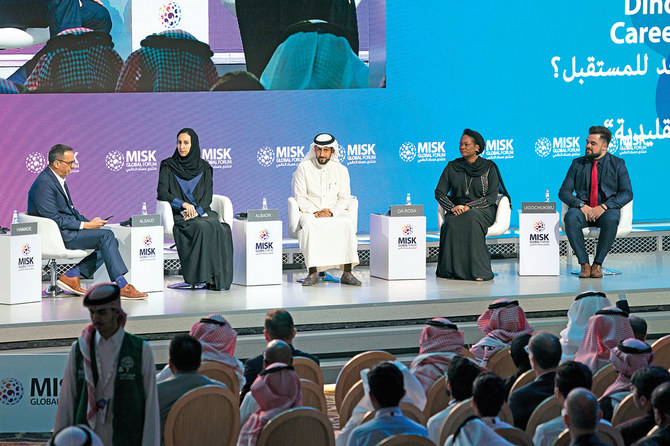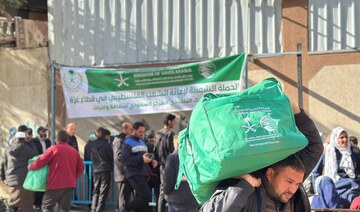RIYADH: The Misk Global Forum began its second day on Wednesday with a session titled “Dinosaur or future-fit? Careers in a post-job era.”
The session discussed the evolution of change in the workplace. Panelists included Dr. Badr Al-Badr, CEO of the Misk Foundation; Princess Aljohara Al-Saud, partner at Henning Larsen studio; Ifeyinwa Ugochukwu, CEO of the Tony Elumelu Foundation; and Ezequiel da Rosa, CEO and founder of Piipee.
Princess Aljohara, one of the first Saudi female architects, discussed the hardships she faced when she first started working.
“Few organizations at that time had women in their offices,” she said. Undeterred, she “saw an opportunity and grabbed it.”
She said: “I progressed and started as a junior architect. My skills and machines gradually developed and I became a business development manager in Saudi Arabia.”
Al-Badr said “many organizations,” including the Misk Foundation and the Saudi Education Ministry, “are focusing on reskilling and retooling.”
He added that the ministry is working to amend the curriculum to better suit the labor market.
But he urged youths to be proactive about acquiring skills. “Take charge of your career. Don’t wait for the education system to be fixed,” Al-Badr added.
He said: “The current careers are very different from the ones of the previous generation,” adding that “the careers of our children will significantly differ from the current careers.”
He stressed the need to improve personal skills, as traditional universities have always focused on technical skills, while personal skills come at a secondary level.
Al-Badr pointed out that personal skills are represented in work ethics, presentation skills, speaking skills and emotional intelligence, adding that some universities have started teaching them. Misk has also designed specialized programs to enhance those skills.
He called on students to take the initiative and not wait until universities change their curricula and correct the educational system. He pointed out that there are many places to acquire these skills, whether through Misk’s programs, or the internet, in addition to many government programs that enhance the personal skills of entrepreneurs, freelancers, or even traditionalists.
Al-Badr explained that many organizations, including Misk, are focusing on reteaching skills and tools, pointing out that the Ministry of Education is relaunching new curricula. He also discussed partnerships between universities and major companies for the formulation of courses that best suit the labor market and workplaces.
Ugochukwu said: “One thing that computers and AI (artificial intelligence) can’t do is show compassion. It’s what people have, and that’s what’s critical in the future.”
She said her foundation has trained over 10,000 African entrepreneurs. “The key word is training, training, training,” she added.
“We have a strong emphasis on leveraging technology. The Fourth Industrial Revolution is on its way, and Africa sure doesn’t want to miss it.” A huge part of entrepreneurship is to “create a solution that doesn’t exist,” Ugochukwu said. To her, entrepreneurship is not “about starting a business.” Rather, it is a “mindset of doing it in the best possible way.”
She added: “Every human being has an innate talent that’s unique to them. We must tap into that talent to see outstanding achievement.”
Da Rosa, who has been an entrepreneur since the age of 16, said: “The most important thing is to make people happy and help them achieve their dreams. If you do that, you have a team.”
He added: “The point of being an entrepreneur is to do and to move. I think everyone here can do something and change something.”



























